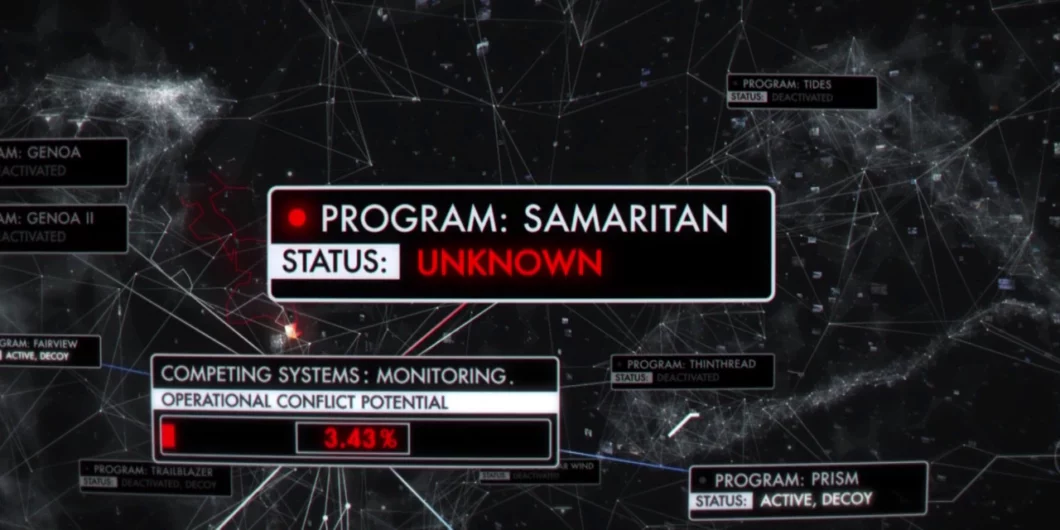Kojak represents what the American public wants in its cops: unimpeachable integrity, unswerving dedication, and a willingness to sacrifice.
Playing God with AI
Good fiction, especially science fiction, can be prophetic, not because the writer has some mystical way of reading the future, but because, as Southern Catholic novelist Flannery O’Connor once wrote, “prophecy is a matter of seeing near things with their extensions of meaning and thus of seeing far things close up.” Audiences turned out in record numbers this past summer to see Jim Caviezel’s film Sound of Freedom, which exposed the tremendous global evil of child trafficking. But areas of domestic policy deserve similar concern, as American politics is currently suspended over an abyss, with a bipartisan board unwilling to recommend ending surveillance of US citizens despite noted partisan abuse by the FBI, and an executive order (apparently ghostwritten in part by Barack Obama) aimed at “harnessing [Artificial Intelligence] for good” by eliminating its potential use for “disinformation.” Americans looking for a bit of domestic political prophecy should watch Caviezel’s TV serial Person of Interest (2011–2016).
Caviezel is most known for his portrayal of Jesus in Mel Gibson’s The Passion of Christ (2004), but Person of Interest involves a different manner of ”playing God.” In the series, directed by Jonathan Nolan, Caviezel plays John Reese, an ex-CIA agent, washed-up and on the brink of suicide before he’s given a job (and more importantly, a purpose) by Harold Finch, played by Michael Emerson. Finch is a reclusive billionaire who, as we find out, in the wake of September 11, created an AI for the US government, designed to prevent future terrorist attacks. Not only an incredible technical mind, Finch also has a delicate moral conscience, and builds what he refers to as “The Machine” as a closed system, such that it only submits to a secret executive branch department the social security numbers of potential domestic terrorists when it senses an imminent danger, creating a list of relevant threats to national security. As Finch later says, the Machine is a shield, not a sword: it’s built so that the government cannot use it to directly target specific people. What begins as a relatively simple police serial with a twist thus becomes a complicated multi-plot vehicle, in part for extended reflection on the ethics of AI creation and its use in government surveillance.
While Finch’s virtuous design prevents his Machine from being abused by the black-ops team which uses its intelligence, other engineers are neither as clever nor as ethical. One of the show’s major plot lines reveals the danger of such technology without Finch’s concern for its abuse, as a private corporation, Decima Technologies, aims to bring online a rival AI, Samaritan, in partnership with the government. A major theme of the show during this arc (and this well before the public-private free speech policing of the 2020 election so well documented by Ben Weingarten) is in fact the grave potential of partnerships between governmental and so-called “private” entities to endanger the liberties and the common good of the American people. This danger is one about which the show’s libertarian House Representative Roger McCourt is unable to care: as long as the government isn’t violating the people’s civil liberties, he’s unworried about corporate collusion with the state. It matters little to McCourt that Decima is paying him off with stock tips. On principle, he stands with them and would do no other. His is an anti-political (therefore anti-democratic) pro-corporate stance that refuses to countenance the way that corporate non-state actors can damage the public square, virtual and real, by digitally “indexing, ordering, and controlling the lives of ordinary people.” As powerful actors within our country, corporations developing AI will have some relationship with the government, but it remains to be seen what that will be.
The action of the show’s individual episodes reveals that while the people’s representatives and their corporate partners aim at control, Finch and Reese are concerned precisely with serving the good of individual persons. With the amount of information the Machine sees, it predicts not only relevant threats but also crimes “irrelevant” for government purposes—every day planned murders, kidnappings, and fraud. Finch and Reese act, day in and day out, to identify numbers from the ”irrelevant” list, who may be victims or perpetrators of grave crimes, and to prevent evil from coming to pass wherever they can act. What viewers come to see across the span of the show is that for Finch, no man, woman, or child is ”irrelevant,” but as human persons, they have a unique dignity that is worth protecting even at great cost. It is his commitment to this Christian understanding of the person (even as religion is rarely mentioned within the show) as opposed to the pagan conception regaining traction in our society which grounds his partnership with John and others, and which distinguishes their vigilantism from the illegal acts of other groups in the show, such as the libertarian privacy terrorist group Vigilance, the new gang called the Brotherhood, or the government project Northern Lights which acts on intelligence provided by the Machine.
This understanding of the unique worth, history, and destiny of human persons is reflected not only by Finch’s choices, but by narrative choices made about the show. While Sound of Freedom reveals a careful examination of heroism, Person of Interest weaves together parallel but divergent character arcs so as to reflect on the paths into or out of nihilism, the philosophical despair that the world fundamentally lacks meaning without human strife to create it. This is certainly an important theme in our own time, where the nihilistic left melts down statues of the conquered (soon to include the American founders, no doubt), fights with police to support the Hamas-led genocide of Jews, and, not content with having turned one state into an infanticide regime by the use of out-of-state lobbying groups, funded by leftist billionaires like Michael Bloomberg and George Soros, take aim at another state, one controlled by Republicans. Christians on the Right are confronting a different kind of nihilism, the Nietzschean vitalism propounded by Bronze Age Pervert, the pseudonym associated with a former Yale Politics PhD student, whose disciples tend to ally politically with conservative-populists as members of the nascent dissident right, but whose spiritual beliefs are more fundamentally aligned with the paganism of the left. While nihilism on the left poses both a physical and psychological threat to the character of our republic (if we can keep it), right-nihilists, if they do not change their master, as Dan Mahoney recently suggested, might corrupt the spiritual character of the American citizenry in an inverted but no less dangerous way.
Person of Interest reveals not only political problems pressing in our own day but also the human dynamics which create and potentially resolve them.
The emergence of the rival AI, Samaritan, shows that the morality of these technologies depends a great deal on that of their creators: the question, to borrow from investor Nate Fischer, is “who will catechize the bots?” That Samaritan and the Machine regard human beings in a fundamentally different way is revealed in an episode titled “The Cold War,” where the two AIs’ analog interfaces, a child named Gabriel and a woman with the alias Root, meet for a conversation. Samaritan sees humans as fundamentally broken beings who only make broken systems, claiming that the world humans have built is “a cesspool of crime, corruption, and poverty; where there isn’t war, there’s greed, where there isn’t greed, there’s hunger.” When the Machine responds that humanity can’t be changed, Samaritan agrees, but claims it can “reshape their reality.” “Human beings,” Samaritan claims, “need structure lest they wind up destroying themselves” and promises to provide the firm hand of a god, who like Hobbes’s Leviathan, by possessing supreme power can end the civil strife of wars caused by conflicting beliefs, whether religious or ideological. Samaritan implies that its apotheosis will be voluntarily provided, that humans will want to believe in it.
In a line that might have come from G. K. Chesterton’s The Everlasting Man, the Machine retorts, “I have come to learn that there is little difference between gods and monsters,” cognizant as it is of the temptations it has encountered to violate its moral code. The Machine, while aware of human fallibility, is also conscious of the grandeur of human free will and desires to preserve human agency in the world, whereas Samaritan embraces a nihilistic anthropology, considering humans as simply power-hungry, money-grubbing animals that need to be utterly ruled by a higher power if they are to transcend their own vice. In a world where competing AIs are already a reality, we should ask what worldview those creating such systems espouse, and how their morality might affect its programming, as the Machine’s character is largely determined by Finch’s own.
An episode in the show’s final season reveals clearly the impact that Finch’s character has on others around him, such as Root, the rogue female hacker and his former adversary. She would have become more like Samaritan’s prophet had she not met and worked with Finch. Root, when a child named Samantha Groves, witnessed the essential corruption of the adult world, unwilling to listen to children when the lives of their friends are at stake, simply because of concupiscent desire. In response, she takes her technical talent and works for the highest bidder, earning herself power and money, not hesitating to kill or destroy families in the process and exemplifying a kind of libertarian nihilism: the only value she sees is in what she can gain for herself. However, her time spent with Harold and the Machine shows her human dignity, not in the abstract, but as a real way of living in the world, and her friendship with Finch’s group leads her to the highest form of love, sacrificing herself for her friend.
By contrast, Greer, the nemesis of the latter half of the series, was once an MI6 agent, who, after discovering that his superior officer was taking money from the Soviets, despairs of the idea of loyalty to the nation. He declares the nation-state obsolete, and later works to subject humanity as a whole to the supposed wisdom of an omniscient AI. “We are all men without a country now,” a young Greer tells his superior as he points a pistol at the older man’s chest. “These invisible lines we draw on the world—I realize they have no meaning. No one else has any loyalty to his homeland, so why should I? One day, these invisible lines will be erased, and the wars between nations will be as antiquated as this agency.” Greer’s progressive-globalist optimism rests upon a nihilistic understanding of human nature and our relationship to our patria; when the techno-elites of our time, who espouse similar beliefs, that which Dan Mahoney and Pierre Manent call “the religion of humanity,” develop incredibly powerful AI platforms and take it upon themselves to construct powerful AI systems, we should believe that the bots will be built in their image, crafted to rule the American people they consider mere hoi polloi.
Thus the show reveals not only political problems pressing in our own day but also the human dynamics that create and potentially resolve them. Perhaps what the United States needs in the midst of our current woes is not a Protestant Franco or a Red Caesar but what our Constitution is designed for, “a moral and religious people,” of which Harold Finch and his friends provide a passing likeness.



